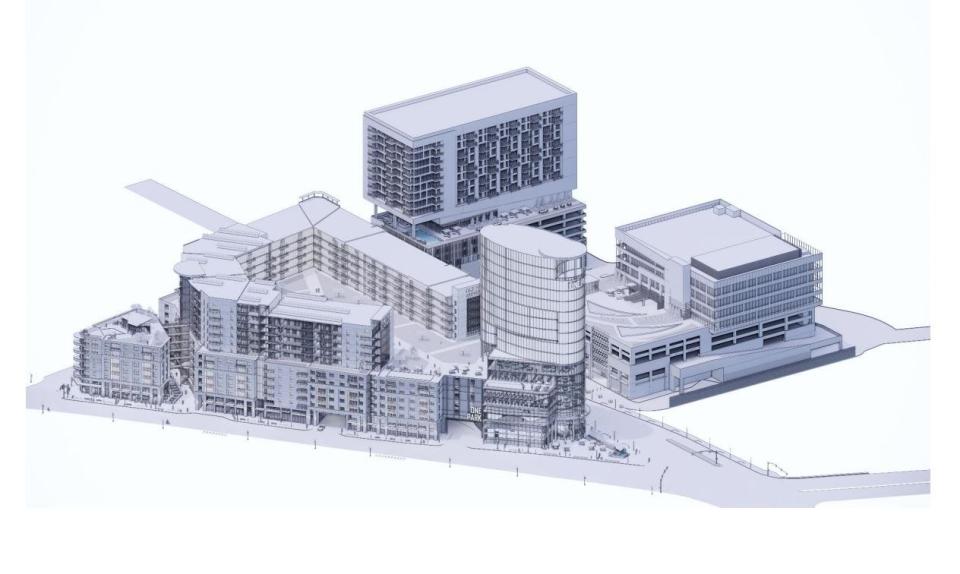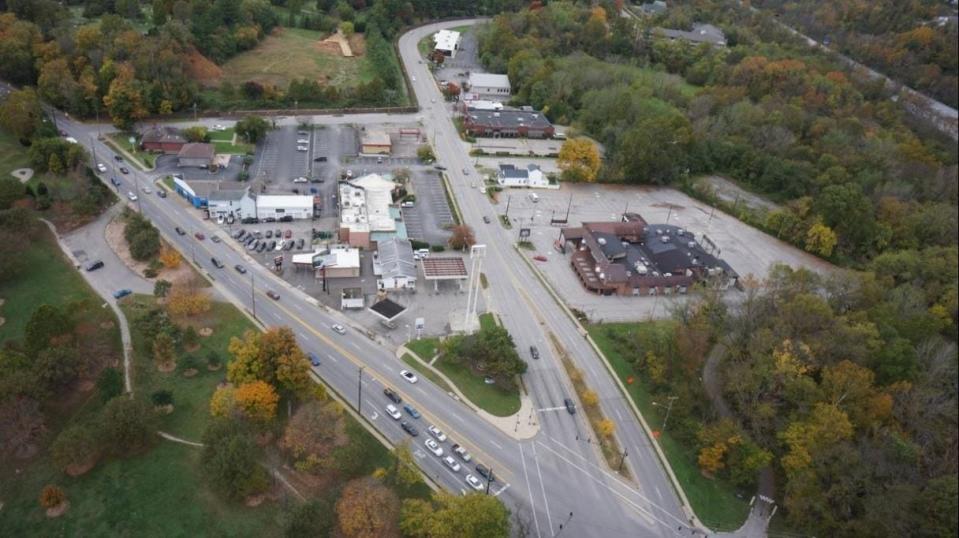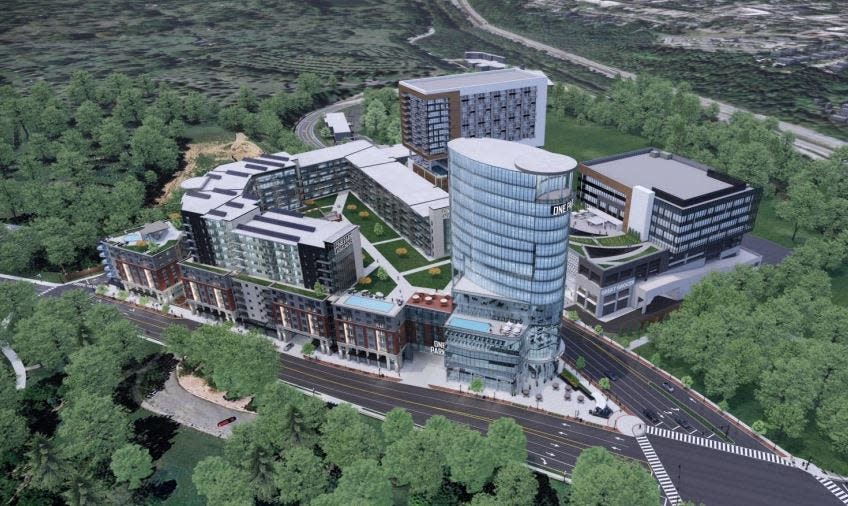One Park won't be built without huge city investment. Louisville Metro Council now to decide
A financing plan that would send most of the local tax revenue raised at the proposed One Park complex back to its developer over the next three decades is heading to Louisville's Metro Council for approval.
The city's Labor and Economic Development Committee recommended the tax-increment financing plan for approval on a 6-2 vote, with council members Tammy Hawkins and Donna Purvis voting against it. The full council will vote at its next meeting on Dec. 14.
The TIF, put forward in an ordinance in late November by Metro Council President Markus Winkler, would send 80% of local tax revenue raised at the complex back to Jefferson Development Group, the developer behind the project, over the course of the next 30 years, with a cap at about $114 million. The development group will also apply for subsidies from the state if the local ordinance is approved.
Those investments, Jefferson Development Group owner and CEO Kevin Cogan said, are the linchpin of the project. The planned One Park complex — a seven-acre plot with towers including residential, retail and restaurant space along with a grocery, a hotel and more than 2,000 parking spaces — will not be built without them.
"If it is not for the TIF and the capability of the TIF to support the project, the project does not pencil. Period," he said. "It does not pencil."
'A public-private partnership'

Cogan spoke to committee members Tuesday after about an hour of discussion over the numbers behind the development, which was first proposed in 2016 and has since been given preliminary approval pending financing.
Pat Mulloy, deputy mayor for economic development, said the "extraordinary project" would spur investment in Louisville, which has potential for growth as a city with "relatively cheap labor (and) relatively inexpensive real estate compared to other markets."
The complex's residential component includes plans for between 600 and 700 apartments, which Mulloy said would all be rentals at different sizes and price points. Between 5% to 7% of units would be rented at prices deemed affordable to the area, estimated by Louisville Cabinet of Economic Development Executive Director Jeff O'Brien to be in the $1,200-per-month range.
The plan has spurred controversy by opponents who believe it should include more affordable housing units and who say the city shouldn't help subsidize a private development that is not a public asset, such as the KFC Yum! Center.
Metro Council member Andrew Owen, who represents the district where One Park would be built, is among them. He didn't vote in the committee meeting but made it clear that he remains against financing the project with public subsidies, though he would support a similar development without that taxpayer investment.
"This project checks a lot of boxes for me," Owen told committee members. "... (But) it's a pretty isolated development that will do certain things. But to me, it's not a public asset that, like the arena, multiplies the investment that I think is inherent to projects that should be supported by TIFs."
Cogan argued the project would be unlike anything currently in the city but is relatively common in peer cities such as Indianapolis and Cincinnati. He's lived in Louisville for most of his life and while it would be "very easy to go back and say, 'It's all zoned commercial, we'll just build Chipotles, Panera Breads, Taco Bells and Thornton's oil," he said he's motivated and "committed" to seeing the project through.
It won't happen without some investment from the city, though, Mulloy said.
"I do not believe this project would be built without public support," he said before the vote. "I believe at the heart of making the economics work in this project is the necessity of a public-private partnership."
After the meeting, Cogan said "very legitimate questions were raised" during the hearing and stressed that the city's investment is based on the success of the project after it's underway — some who oppose it "still believe that the city is writing a check for $100 million, and that's the furthest thing from the truth."
Scaling back the project also doesn't make sense given the money Jefferson Development Group spent to buy the land, he added, and the money it would require to build a development of any size on the property.
"If I have $20 million in land acquisition ... if I just built two stories and 25 units proportionate, it makes even further less sense," Cogan said.
Opponents speak out at public hearing

Ahead of the committee hearing, city officials took comments Monday night from concerned Louisville residents, as well as a few supporters who spoke out at a public hearing about the TIF.
Former Metro Council member Bill Hollander, who represented the district where One Park will be built until leaving office at the end of last year, took aim at the amount of affordable housing included in the plan. He supported rezoning to allow the project to be built while in office, he said, but the plan has changed since then.
Developers in 2019 had agreed to set 10% of residences as affordable housing if a TIF were involved, but the new ordinance sets that figure at 7%, with an option to reduce it to 5% with a payment of about $1 million to Louisville’s Affordable Housing Trust Fund. O'Brien previously told The Courier Journal that reduction came after construction prices rose significantly amid the COVID-19 pandemic, but Hollander pushed back.
"I can’t find any city in the entire country that has said, ‘We are for reducing the requirements for affordable housing because construction and interest costs have risen.’ Not one," he said. "Louisville would be the first to say developers can’t afford to include the required and in this case agreed-upon affordable units anymore. That may be the mayor’s position, but Metro Council shouldn’t allow it."
Cogan on Tuesday noted it's more expensive to build affordable housing on a site like the One Park property and said a potential $1 million payment to the Affordable Housing Trust Fund could be used to build a lot more units in a different part of town.
Derrick Pedolzky, president of the Limerick Neighborhood Association, questioned whether the One Park property was truly blighted. It sits in Irish Hill at the corner of Lexington Road and Grinstead Drive, a gateway between neighborhoods including Cherokee Triangle and Crescent Hill, and borders the Cherokee Golf Course.
"I love the project, but where I have problems with it is Limerick — my area — Old Louisville (and) the West End all need investments like this, and we are definitely way more blighted than one of the most beautiful corners next to a beautiful golf course in the city," he said.
The project has some support, though. Clark Welch, Greater Louisville Inc.'s vice president of economic development, said the city's chamber of commerce supports the TIF because One Park "stands to greatly enhance an important intersection with dense, multi-use development on the edge of downtown."
"Projects of this scale often require investment from the public sector, and One Park is no different," Welch said. "Investing public funds in performance-based economic development and incentives creates an environment that facilitates growth while managing risk and improving the overall value of the area."
Louisville TIF is just the first step

The proposal to send an estimated $114 million in future Louisville tax revenue to developers behind the planned One Park plaza represents just a portion of the money they could be in line to land.
The city ordinance laying out terms of the TIF plan includes a financial analysis showing an additional $218.2 million in state tax revenue could eventually be set aside for Jefferson Development Group.
Jim Parsons, an attorney who worked with developers on the proposed TIF's terms, told The Courier Journal the developers' next step if the local ordinance passes would be to reach out to state officials about potential incentives, a process he estimated would take about nine months. The blueprint has already been approved by the city, and Cogan said his team has already had early discussions with the state's economic development committee "just to let them know about the project."
The local TIF is also contingent on approval of the separate state TIF. If the Louisville ordinance is approved, but the project does not receive state subsidies, then the local TIF would be voided or sent back to Metro Council for revisions.
Potential revenue projections are based around the development being built according to plan and at a final price of $554 million, including $165 million in nearby infrastructure improvements including parking garages. But in all, according to an analysis from Commonwealth Economics completed in July, just over $332.3 million in taxes raised on the property would be sent back to Jefferson Development Group over the course of 30 years.
Still, the analysis also found One Park would be a boon for the local economy, with an estimated economic impact of $17.4 billion over 30 years, including $6.4 billion in wages from about 2,400 jobs created.
Reach Lucas Aulbach at laulbach@courier-journal.com.
This article originally appeared on Louisville Courier Journal: Louisville One Park plaza TIF moves forward for Metro Council vote

